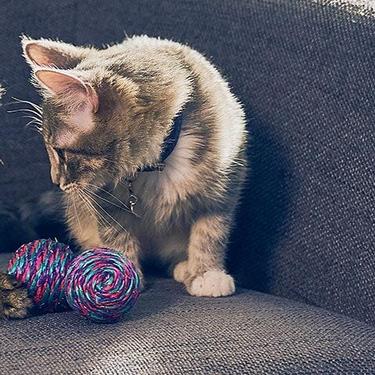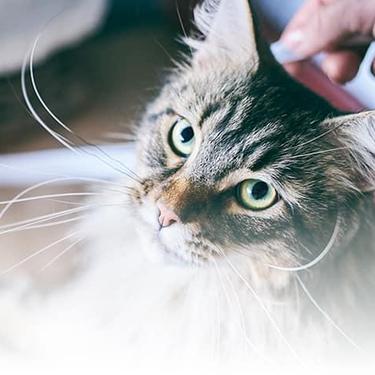
-
Find the right food for your petTake this quiz to see which food may be the best for your furry friend.Find the right food for your petTake this quiz to see which food may be the best for your furry friend.Featured products
 Mature Adult Dog Food
Mature Adult Dog FoodHill's Science Plan Mature Adult Multipack Wet Dog Food with Chicken & Beef are complete premium pet foods for mature adult dogs from 7 years. Your dog will love these deliciously smooth and savoury minced loaves, formulated to deliver the appropriate amount of energy to support the needs of adult dogs.
Shop Now Puppy Food
Puppy FoodHill's Science Plan Puppy Multipack Wet Dog Food with Chicken & Beef are complete premium pet foods for growing puppies from weaning until 1 year old and for pregnant and nursing dogs. Your puppy will love these deliciously smooth and savoury minced loaves, formulated for balanced nutrition and overall health.
Shop Now Adult Wet Dog Food with Beef
Adult Wet Dog Food with BeefHill's Science Plan Adult Multipack Wet Dog Food with Chicken, Beef & Turkey are complete premium pet foods for adult dogs from 1 year. Your dog will love these deliciously smooth and savoury minced loaves, formulated for balanced nutrition and overall health.
Shop NowFeatured products Light Adult Multipack Wet Cat Food with Chicken & Ocean Fish
Light Adult Multipack Wet Cat Food with Chicken & Ocean FishTender chicken chunks in gravy for cats, with L-carnitine and fewer calories for ideal weight management. Packed with high-quality protein, omega-6s, and vitamin E for shiny fur and healthy skin.
Shop Now Adult Multipack Wet Cat Food with Beef, Ocean Fish & Chicken
Adult Multipack Wet Cat Food with Beef, Ocean Fish & ChickenTender chunks in gravy for cats, with high-quality protein to maintain lean muscle. With vitamin E and omega-3s & -6s for healthy skin and balanced minerals to support healthy vital organs.
Shop Now Mature Adult Wet Cat Food with Chicken
Mature Adult Wet Cat Food with Chicken
Tender chicken chunks in gravy for mature adult cats. Made with easy-to-digest ingredients, high-quality protein for lean muscle maintenance and antioxidant vitamins C+E for optimal health.
Shop Now -
Dog
- Dog Tips & Articles
-
Health Category
- Weight
- Food & Environmental Sensitivities
- Urinary
- Digestive
- Joint
- Kidney
-
Life Stage
- Puppy Nutrition
- Adult Nutrition
- Senior Nutrition
Cat- Cat Tips & Articles
-
Health Category
- Weight
- Skin & Food Sensitivities
- Urinary
- Digestive
- Kidney
-
Life Stage
- Kitten Nutrition
- Adult Nutrition
Featured articles The Right Diet For Your Pet
The Right Diet For Your PetIn people, the right diet is very important. If you are eating the wrong way for your metabolism, activity level, age and lifestyle you could end up with health issues.
Read More Show some love with wet foods: a great choice for pets with health issues
Show some love with wet foods: a great choice for pets with health issuesShow some love with wet foods: a great choice for pets with health issues.
Read More The Incredible Science Behind Your Pet's Microbiome
The Incredible Science Behind Your Pet's MicrobiomeLearn what your pet's microbiome is, how it contributes to your pet's gut and overall health, and why nutrition is important in maintaining healthy microbiomes.
Read More -


Congratulations! You’re about to welcome a kitten into your family and hopefully embark on a long and beautiful friendship. It’s essential to be well-prepared, but new kitten checklists are not just about what things you need to buy for their arrival. It starts way before that…
Being right for each other
Cats often live into their late teens nowadays, so getting a kitten needs to be taken seriously as a long-term commitment! Cats are often seen as independent pets, needing much less energy than dogs, but they still need plenty of time and attention, and they cost more money than you may expect. The PDSA estimates that the average cat will cost at least £11,100 over their lifetime, which is a significant sum in anyone’s book. Make sure you have the time, space, energy and money before taking on a kitten.
Remember that cats have a lot of behavioural needs, such as scratching, climbing and hunting, that some owners struggle to tolerate. Be sure that a cat is the right pet for you and your family.
Getting a great head start
Most of us get a kitten because we want a loving, fun addition to the family. Kittens need to grow up in nurturing environments and be well socialised and habituated by the breeder from a very young age. This means giving them positive experiences of adults and children, being handled, and the noises and smells of a family home. Always research your breeder and ask lots of questions. Never get a kitten without seeing the mum. If you’re taking a kitten from an adoption centre, a reputable one will give you lots of information and ask you lots of questions too.


Tasty Tips
Things you’ll need before your kitten comes home
Leaving mum and moving to a new home is a stressful time for any kitten. If you can give the breeder a blanket a few weeks beforehand, the kitten will already be familiar with the smells of their new home when they arrive and will feel better from the word go. You can also ask your vet about pheromone diffusers to install before the kitten’s arrival. These can help make cats and kittens feel more relaxed in a new environment.
Things you’ll need to buy include:
Cat carrier. Never transport a cat or kitten loose. Use a sturdy carrier, preferably with an opening on top.
Blankets and beds.
Kitten food. Always start by getting enough food from the breeder or adoption centre for at least a week to avoid a sudden change and an upset tummy. Ask your vet about the best kitten food to feed and how to do the gradual change from one to the other.
Bowls for food and water. You may want to include a puzzle feeder to keep meal times engaging.
Litter tray and litter. Try to avoid dusty types of litter. Ideally, you should have one more litter tray than you have cats, so you’ll need a minimum of two. These need to be placed in quiet, secluded places and far away from food and water.
A comb or brush that’s gentle and appropriate for grooming a kitten.
Scratching posts or pads. Cats have an innate need to scratch. It keeps their claws in good condition, strengthens muscles and marks their territory. If you don’t provide posts, they will scratch your furniture instead. The choice is yours!
Collar. Many vets don’t particularly like collars on cats as they can cause injury, but it may be law where you live. Microchipping, which is mandatory in some countries, is a much better way to permanently identify your cat. Your vet will be able to advise you when and how to go about this.
Toys. Playing is important to help your kitten gain strength and agility, and is also great for your bond with them. Buy several toys and alternate them to keep it interesting.
Cat flap. Your kitten won’t be going out for a while, but getting a cat flap, or at least organising installation, will make sure you’re prepared for when they are ready to start exploring the outside world. Countries vary widely in their attitudes to free-roaming cats because of the risks to the cat and also the local wildlife, so if and when you let your cat out may depend on where you live. Remember, though, that indoor life can also be a major cause of stress in many cats. Talk to your vet if you’re not sure about the pros and cons.
The warmest welcome
You and your family may be very excited about your kitten’s arrival, but remember that it’s going to be very daunting for your kitten. Put them in one room to start with, with their food, water and a litter tray (well away from the food and water), and try not to pester them. They will naturally hide away to start with. Let them explore at their own pace. Sit quietly in the room and read a book or something to distract you, and let them come to you. This may take a few days.
Bear in mind that if you already have a cat, they may well be very used to having the place, and you, to themselves. Many cats, especially adults, find a new cat or kitten in their house very stressful. Talk to your vet or a licensed animal behaviourist about the best way to introduce them and what to expect.
Whatever your circumstances, when your kitten arrives, be patient, calm and gentle and you’ll get off to a flying start. Enjoy!
Reviewed by Dr. Hein Meyer, DVM, PhD, Dipl-ECVIM-CA


One of our staff authors prepared this article for you
Related products


Tender chunks in gravy for cats, with high-quality protein to maintain lean muscle. With vitamin E and omega-3s & -6s for healthy skin and balanced minerals to support healthy vital organs.

Tender chicken chunks in gravy for mature adult cats. Made with easy-to-digest ingredients, high-quality protein for lean muscle maintenance and antioxidant vitamins C+E for optimal health.

Tender chicken chunks in gravy for cats, with L-carnitine and fewer calories for ideal weight management. Packed with high-quality protein, omega-6s, and vitamin E for shiny fur and healthy skin.
Related articles

There are three common ways to feed a cat. Each way has its advantages and disadvantages.

Kittens grow a lot in their first year, so it is important to provide them with the proper nutrients early, so they grow up healthy and strong. Learn more.

Learn how to make homemade cat treats that are healthy for your pet with this recipe from Hills Pet Nutrition.

From essential vitamins & minerals to different types of meat, learn what to look for when choosing the best cat food for your feline.

Put your cat on a diet without them knowing
Our low calorie formula helps you control your cat's weight. It's packed with high-quality protein for building lean muscles, and made with purposeful ingredients for a flavourful, nutritious meal. Clinically proven antioxidants, Vitamin C+E, help promote a healthy immune system.
Put your cat on a diet without them knowing
Our low calorie formula helps you control your cat's weight. It's packed with high-quality protein for building lean muscles, and made with purposeful ingredients for a flavourful, nutritious meal. Clinically proven antioxidants, Vitamin C+E, help promote a healthy immune system.

